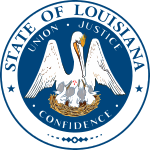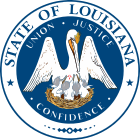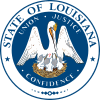Elections in Louisiana
| Elections in Louisiana |
|---|
 |
|
|
Politics of Louisiana |
|---|
 |
|
Since 1977 state elections in Louisiana have used a unique system similar to the majority-runoff system used in some other jurisdictions, which in Louisiana has become known as a “jungle” primary[1] or an "open" primary, where all the candidates for an office run together in one election. If someone gets a majority, that individual wins outright; otherwise, the top two candidates, irrespective of partisan affiliation, meet in a runoff election. This primary system is used for state, parish, municipal, and Congressional races, but is not used for presidential elections.[2]
Louisiana is one of only five states that elects its state officials in odd-numbered years. (The others are Kentucky, Mississippi, New Jersey, and Virginia). Louisiana holds elections for these offices every four years in the year preceding a Presidential election. Thus, the two most recent gubernatorial elections in Louisiana took place in 2015 and 2019. Louisiana is one of 18 states that run separate elections for Governor and Lieutenant Governor, a process that has resulted in Governor-Lieutenant Governor pairs from different parties and/or widely differing political ideologies. For example, current Governor John Bel Edwards is a Democrat, while Lieutenant Governor Billy Nungesser is a Republican.
Louisiana's unique primary system was instituted in 1975 by Democratic Governor Edwin Edwards.[3] Until 1997, the open primary election was held in October, meaning that no election would be held in November if the leading candidate won over 50 percent of the vote in October.[3] Between 2008 and 2010, federal races did not use the jungle primary system.[4][5] Between the passage of the Voting Rights Act of 1965 and Shelby County v. Holder (a 2013 Supreme Court case), changes to Louisiana election law required preclearance with the United States Department of Justice.[6]
Elections in Louisiana fall under the purview of the Secretary of State. Louisiana's current Secretary of State is Kyle Ardoin.
In a 2020 study, Louisiana was ranked as the 24th hardest state for citizens to vote in.[7]
See also[]
- New Orleans mayoral elections
- Political party strength in Louisiana
- 2020 Louisiana elections
- United States presidential elections in Louisiana
References[]
- ^ Brinlee, Morgan. "Louisiana Has Something Called A Jungle Primary". Bustle. Retrieved 2018-10-02.
- ^ Barrow, Bill (8 February 2011). "Department of Justice gives approval to Louisiana's open primaries". The Times-Picayune. Retrieved 20 October 2014.
- ^ a b Mooney, Chris (13 November 2002). "Why Does Louisiana Have Such an Odd Election System?". Slate.com. Retrieved 20 October 2014.
- ^ "Louisiana Law Search". Legis.state.la.us. Retrieved 12 July 2018.
- ^ [1] Archived 2010-08-12 at the Wayback Machine
- ^ Liptak, Adam (25 June 2013). "Supreme Court Invalidates Key Part of Voting Rights Act". The New York Times. Retrieved 20 October 2014.
- ^ J. Pomante II, Michael; Li, Quan (15 Dec 2020). "Cost of Voting in the American States: 2020". Election Law Journal: Rules, Politics, and Policy. 19 (4): 503–509. doi:10.1089/elj.2020.0666. S2CID 225139517. Retrieved 14 January 2022.
External links[]
- Geaux Vote at the Louisiana Secretary of State official website
- Louisiana at Ballotpedia
- Louisiana Elections & Politics from The Times-Picayune newspaper
- "State Elections Legislation Database", Ncsl.org, Washington, D.C.: National Conference of State Legislatures,
State legislation related to the administration of elections introduced in 2011 through this year, 2020
- Louisiana elections
- Political events in Louisiana
- Government of Louisiana
- Louisiana election stubs
